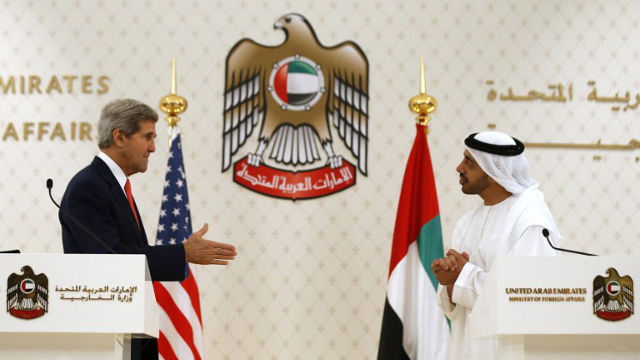SUMMARY
This is AI generated summarization, which may have errors. For context, always refer to the full article.

ABU DHABI, United Arab Emirates – US Secretary of State John Kerry on Monday defended moves to strike a nuclear deal with Iran, saying it would protect Israel and America’s Gulf allies, while stressing Tehran had balked.
His comments came as France said world powers were close to an agreement with Iran on its disputed nuclear drive, despite failure to reach a deal at crunch talks in Geneva on the weekend.
Kerry’s remarks also come as Israel and the US are locked in an bitter war of words over the negotiations to halt Iran’s nuclear drive, suspected to be a front for developing a military capability.
“Our hope is that in the next months we can find an agreement that meets everyone’s standards,” Kerry told reporters in Abu Dhabi.
“The P5+1 was unified on Saturday when we presented our proposal to the Iranians… But Iran couldn’t take it, at that particular moment they weren’t able to accept.”
Kerry insisted that a deal with Iran would protect Israel and other US allies.
“We are confident that what we are doing will protect Israel more effectively,” he said.
Israeli Prime Minister Benjamin Netanyahu has denounced the emerging agreement as “dangerous”, while his defense minister, Moshe Yaalon, called it a “historical mistake.”
Kerry insisted that Washington has the interests of Israel at heart and that he shares Netanyahu’s “deep concerns”.
“But I believe the prime minister needs to recognize that no agreement has been reached about the endgame here, that’s the subject of the negotiations,” said Kerry.
He said sanctions were imposed on Iran to force it to negotiate.
“And if we had to turn to a military option, because we are left no other option, we must show the world we’ve exhausted every possible remedy and opportunity.”
‘War should be last resort’
Israel, the region’s sole if undeclared nuclear power, views a nuclear Iran as an existential threat and has refused to rule out the threat of military action to protect itself.
Netanyahu has reached out to world leaders and to the American public to get his point across.
“Iran gives practically nothing and it gets a hell of a lot. That’s not a good deal,” Netanyahu told CBS television on Sunday.
And in an speech to Jewish-American leaders in Jerusalem, he added: “It is a bad and dangerous deal that deals with the thing that affects our survival.
“And when it comes to the question of Jewish survival and the survival of the Jewish state, I will not be silenced.”
But Kerry insisted in Abu Dhabi that “war should be the last resort” to resolve the dispute with Iran.
President Barack Obama “has stated unequivocally that Iran will not get a nuclear weapon, that is a centrepiece of his foreign policy and he will not bluff,” he said.
Representatives of Iran and 6 world powers gathered in Geneva with high expectations Thursday of a deal but the marathon talks ended inconclusively three days later.
Some media, and off-the-record officials, said no deal was reached because of French reservations on parts of a draft agreement that aimed at lifting some of the crippling sanction on Iran in return for the freezing of much of its nuclear program.
But on Monday French Foreign Minister Laurent Fabius said: “We are not far from an agreement with the Iranians but we are not there yet.”
The so-called P5+1 group – the five permanent members of the UN Security Council plus Germany – and Iran will reconvene in Geneva on November 20 to try to iron out differences.
The negotiations had stalled for years but the June election of Iranian President Hassan Rouhani – seen as a relative moderate – gave fresh momentum to the talks.
Kerry who briefed UAE officials on the Geneva talks also assured them that signs of warmer ties with Iran would not undermine Washington’s commitment to its Gulf allies.
UAE Foreign Minister Sheikh Abdullah bin Zayed Al-Nahayan, meanwhile, spoke of an “exaggeration on tensions between the US and its allies” at the joint news conference with Kerry.
“There could be differences in viewpoints but not on the overall regional strategy,” he said, before Kerry was due to head home at the end of an exhausting seven-nation tour.
The UAE has suffered from sanctions imposed on Iran, its traditional trading partner.
Kerry said UAE officials told him that trade between Iran and its Gulf neighbor dropped to 4 billion dollars from a high of 23 billion due to the sanctions.
“That’s a huge sacrifice,” he added. – Rappler.com
Add a comment
How does this make you feel?
There are no comments yet. Add your comment to start the conversation.